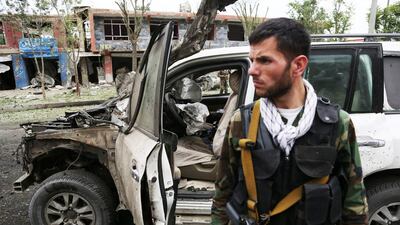KABUL // The leading Afghan presidential candidate, Abdullah Abdullah, narrowly escaped an assassination attempt on Friday when two bombs struck his convoy after a campaign event in the capital.
The attack killed six civilians but Mr Abdullah was unharmed and went on to speak at a campaign rally. Although there was no immediate claim of responsibility, it bore the hallmarks of Taliban militants fighting the Western-backed government.
“My car was the target,” Mr Abdullah said. “It was a big conspiracy against me.”
Mr Abdullah told the rally that his “vehicle was destroyed, but fortunately we escaped it unharmed. Unfortunately a number of our security guards were wounded in the incident, but thankfully their injuries are not so serious”.
The attack came eight days before a run-off vote in which Afghans are to choose a new leader to replace outgoing president Hamid Karzai. The Taliban have vowed to disrupt the balloting, though the first round on April 5 was relatively peaceful.
The attempt on Mr Abdullah’s life appeared to be the first direct attack on one of the candidates, as earlier attacks targeted only campaign offices and workers.
Mr Karzai condemned the attack, saying it was staged by “enemies of Afghanistan who don’t want free elections”.
The interior ministry spokesman Sediq Sediqqi said there was a suicide bombing followed by a roadside bomb. He said nobody in Mr Abdullah’s entourage was killed.
The ministry later issued a statement saying six civilians were killed and 22 were wounded.
But Kabul police chief Mohammed Zahir said both explosions were carried out by suicide bombers – the first was a driver who blew up a vehicle and the second was a suicide bomber on foot.
Conflicting accounts are common in the chaotic immediate aftermath of attacks in Afghanistan.
The blasts destroyed several cars and nearby storefronts, leaving the street littered with twisted metal and other rubble.
Mr Abdullah, a former Afghan foreign minister, was the runner-up in the disputed presidential elections of 2009 and is now a leading candidate to succeed Mr Karzai, who is constitutionally barred from seeking a third team.
Mr Abdullah is running against the former finance minister Ashraf Ghani Ahmadzai in the second round scheduled for June 14.
In the initial balloting, Mr Abdullah won 45 per cent of votes while Mr Ahmadzai came in second with 31.6 per cent. The former presidential candidate Zalmay Rassoul, who is now supporting Mr Abdullah, also was in the convoy on Friday but was not injured.
The vote comes at a pivotal time as the international community prepares to withdraw combat forces by the end of the year. Both Mr Abdullah and Mr Ahmadzai have pledged to sign a security pact with the US that will allow thousands of foreign forces to remain in the country after this year in a training and advisory capacity.
The new president will face the daunting task of resetting relations with Washington, which have taken a battering from Mr Karzai’s increasing anti-American rhetoric.
During the Soviet occupation in the 1980s, Mr Abdullah served as adviser to and spokesman for Tajik warlord Ahmad Shah Massoud, who was assassinated by Al Qaeda two days before the September 11 attacks.
In the early days after the US-led alliance toppled the Taliban, Mr Abdullah became the face of Afghanistan’s anti-Taliban movement, giving frequent press conferences to international media.
* Associated Press

